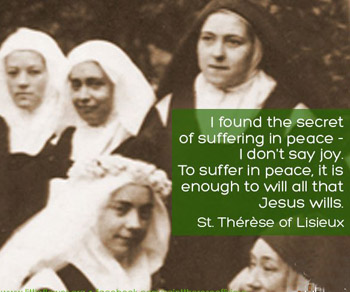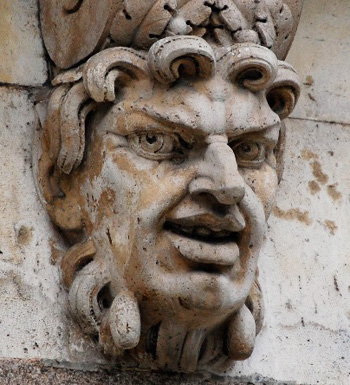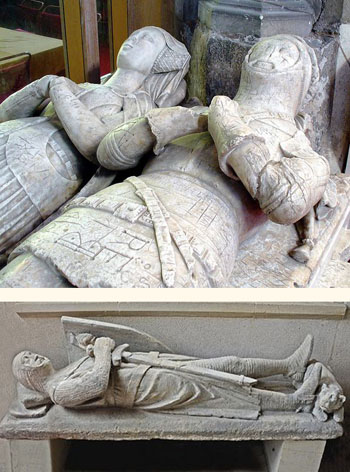Catholic Virtues
 |
 |
 |
 |
 |
 |
 |
True & False Paths to Happiness - II
Happiness & Our Final End
Having looked at the false roads to happiness and the futility of egalitarianism to achieve this end, I go on to consider what constitutes real happiness.
We have seen that either wanting to be everything or not wanting to be anything does not bring happiness. So, then, what does?
To answer, we need to stop and look at the relationship between happiness and our final end.
 At the school where I studied, a priest once posed this problem to the students.
At the school where I studied, a priest once posed this problem to the students.
"Imagine," he said, "that a kernel of wheat could think. Then someone would tell it, ‘You were created to be the food of men. Now then, man will harvest and grind you in order to consume you. With this, you will reach your final end.’ Should the kernel of wheat be horrified or enthused about fulfilling its purpose in life?
“It would necessarily feel the pain of its own immolation. But over and beyond that, if it were rational, it couldn’t help but feel the happiness proper to a being that reaches its final end. This happiness is much greater than the great unhappiness that comes from not reaching its end for lack of immolation.”
The priest placed this alternative: Either feel the pain of the immolation or feel the unhappiness. However, for us this does not seem to be quite the case. We as men should be able to combine the two feelings. Deep down we should love the fact that we achieve our proper end, even if it involves pain to do so.
 The happy man is not the one who lives long or with every pleasure. Rather he is the one who follows his nature and reaches his proper end. He has in mind the good of his soul, although he can suffer greatly.
The happy man is not the one who lives long or with every pleasure. Rather he is the one who follows his nature and reaches his proper end. He has in mind the good of his soul, although he can suffer greatly.
In human life there is a superior happiness, which by far makes up for the misadventures and misfortunes of everyday life.
In this way he becomes "the man who is" as opposed to the "man who has, knows, makes or can."
He has achieved what can be achieved with regard to happiness in this valley of tears. He has peace in his soul.
Clearly, the perspective of everlasting happiness in Heaven is the most complete solution to the problem, for earthly life is but a shadow compared to eternal life. But even if there were only this life, it is only worth being lived in this way. Everything else causes immense frustration.
It is not about having or making, but rather ‘being’
Nothing, of course, impedes a man from having, knowing, making or gaining power, provided he does so properly.
But, above all, it is necessary "to be." Each one must be authentically himself.
He has to choose between being authentically himself or being a caricature of himself. Thus, the one who tends toward true happiness – the happiness that is attainable on this earth – is the "man who is," not the one "who has," "who knows," "who makes" or "who can." Even when he has nothing, knows little, does nothing or cannot achieve anything, the "man who is" is on the right path to happiness.
Egoism is the enemy of the ‘man who is’
The "man who is" has an enemy, and that enemy is egoism.
Here is the key to understand the modern day anguish, its causes and how to escape it. When an exaggerated self-love enters, man has no happiness and the civilization he engenders is one of egoism.
 Today each one takes care of himself, first and foremost. Doctrines are scorned, principles are despised, beauty is disdained, so much so that even the word "ideal" seems ever more remote and rarely heard.
Today each one takes care of himself, first and foremost. Doctrines are scorned, principles are despised, beauty is disdained, so much so that even the word "ideal" seems ever more remote and rarely heard.
The candidate for a "man who has, knows, makes and can" receives this advice: "Now John, put yourself first, take care of yourself and your own interests. Don't worry about anything else because, ultimately, there is only you to take care of yourself. Turn to yourself. Take care of your little life, your interests. Strive to fulfill yourself, you and only you! Live only for yourself!"
And John goes along through life, carefully ignoring anything that does not concern himself. Will he be happy? It does not seem so.
In contrast, consider the medieval tomb effigies, those gisants found in Gothic cathedrals with their serene faces, swords, armor. Sometimes the man is lying beside his wife, like brother beside sister.
It is another model of happiness, a true model.
Happiness does not lie in frenzy, but in harmony
True happiness does not lie in absolute tension or absolute stability, but in a harmony between the two.
 Many people have become used to the idea that only in sensations – in Brazil, we would say, in "torcida" or “cheering together” – they find happiness. Without this kind of agitated expectation in their lives, they think they are unhappy. In fact, they are unhappy, but for a different reason: It is because they lost the notion of true happiness.
Many people have become used to the idea that only in sensations – in Brazil, we would say, in "torcida" or “cheering together” – they find happiness. Without this kind of agitated expectation in their lives, they think they are unhappy. In fact, they are unhappy, but for a different reason: It is because they lost the notion of true happiness.
Without this “cheering together,” the relationships between people improve. Life cannot be a competition between egoists in a Dantesque battle, pretending to laugh and find an enormous pleasure in existence, but in reality tearing each other apart and feeling that life is meaningless.
Often the cause of this kind of "cheering together" is the perverse tendency to be self-sufficient. I think there is a very close relationship among self-reliance, orphanhood and neurosis.
Quite often I wonder if I would be the calm man that I am without my mother's affection that hovered over me. In her I saw dignity without fortune, sweetness without cowardice, intransigence without hardness and nobility without arrogance. And this affection transmitted a great calm to me.
Continued

We have seen that either wanting to be everything or not wanting to be anything does not bring happiness. So, then, what does?
To answer, we need to stop and look at the relationship between happiness and our final end.

If it were rational, the wheat would feel joy to reach its final end
"Imagine," he said, "that a kernel of wheat could think. Then someone would tell it, ‘You were created to be the food of men. Now then, man will harvest and grind you in order to consume you. With this, you will reach your final end.’ Should the kernel of wheat be horrified or enthused about fulfilling its purpose in life?
“It would necessarily feel the pain of its own immolation. But over and beyond that, if it were rational, it couldn’t help but feel the happiness proper to a being that reaches its final end. This happiness is much greater than the great unhappiness that comes from not reaching its end for lack of immolation.”
The priest placed this alternative: Either feel the pain of the immolation or feel the unhappiness. However, for us this does not seem to be quite the case. We as men should be able to combine the two feelings. Deep down we should love the fact that we achieve our proper end, even if it involves pain to do so.

St Therese found the secret to happiness
In human life there is a superior happiness, which by far makes up for the misadventures and misfortunes of everyday life.
In this way he becomes "the man who is" as opposed to the "man who has, knows, makes or can."
He has achieved what can be achieved with regard to happiness in this valley of tears. He has peace in his soul.
Clearly, the perspective of everlasting happiness in Heaven is the most complete solution to the problem, for earthly life is but a shadow compared to eternal life. But even if there were only this life, it is only worth being lived in this way. Everything else causes immense frustration.
It is not about having or making, but rather ‘being’
Nothing, of course, impedes a man from having, knowing, making or gaining power, provided he does so properly.
But, above all, it is necessary "to be." Each one must be authentically himself.
He has to choose between being authentically himself or being a caricature of himself. Thus, the one who tends toward true happiness – the happiness that is attainable on this earth – is the "man who is," not the one "who has," "who knows," "who makes" or "who can." Even when he has nothing, knows little, does nothing or cannot achieve anything, the "man who is" is on the right path to happiness.
Egoism is the enemy of the ‘man who is’
The "man who is" has an enemy, and that enemy is egoism.
Here is the key to understand the modern day anguish, its causes and how to escape it. When an exaggerated self-love enters, man has no happiness and the civilization he engenders is one of egoism.

The egotist looks out first for himself
The candidate for a "man who has, knows, makes and can" receives this advice: "Now John, put yourself first, take care of yourself and your own interests. Don't worry about anything else because, ultimately, there is only you to take care of yourself. Turn to yourself. Take care of your little life, your interests. Strive to fulfill yourself, you and only you! Live only for yourself!"
And John goes along through life, carefully ignoring anything that does not concern himself. Will he be happy? It does not seem so.
In contrast, consider the medieval tomb effigies, those gisants found in Gothic cathedrals with their serene faces, swords, armor. Sometimes the man is lying beside his wife, like brother beside sister.
It is another model of happiness, a true model.
Happiness does not lie in frenzy, but in harmony
True happiness does not lie in absolute tension or absolute stability, but in a harmony between the two.

A harmonic serenity in the medieval effigies
Without this “cheering together,” the relationships between people improve. Life cannot be a competition between egoists in a Dantesque battle, pretending to laugh and find an enormous pleasure in existence, but in reality tearing each other apart and feeling that life is meaningless.
Often the cause of this kind of "cheering together" is the perverse tendency to be self-sufficient. I think there is a very close relationship among self-reliance, orphanhood and neurosis.
Quite often I wonder if I would be the calm man that I am without my mother's affection that hovered over me. In her I saw dignity without fortune, sweetness without cowardice, intransigence without hardness and nobility without arrogance. And this affection transmitted a great calm to me.
Continued

Posted January 22, 2020





